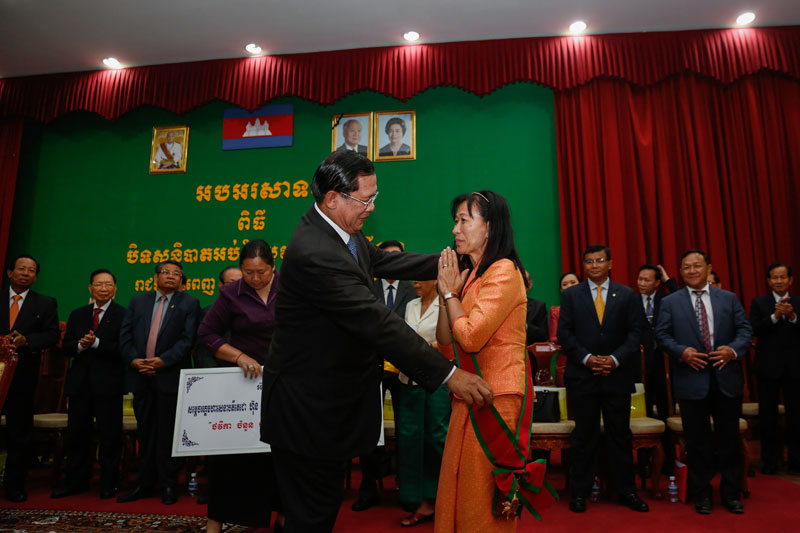Prime Minister Hun Sen on Thursday took aim at the Global Teacher Prize, a major new award that a Cambodian teacher was recently shortlisted for, saying that the competition might have been rigged in favor of the U.S. winner.
Speaking at the Education Ministry’s annual meeting in Phnom Penh on Thursday, Mr. Hun Sen said he had been monitoring the competition from Tokyo earlier this month and that he voted online for Neang Phalla, the Cambodian finalist. Ms. Phalla teaches at Krousar Thmey, an NGO school for the blind and deaf, and helped develop the Khmer version of braille.

At a ceremony in Dubai on March 15 attended by former U.S. President Bill Clinton, American teacher Nancie Atwell took home the top prize of $1 million. Mr. Hun Sen said Thursday that Mr. Clinton’s presence suggested that the competition was not entirely fair.
“It meant that a person was already prepared for being elected,” he said. “We just went as a perfunctory participant. It’s easy to understand the reason because Clinton was invited already. It meant that the U.S. teacher must be elected.”
“But it’s enough for us to receive the top 10,” he added. “I would also be happy if you were elected only for the top 50 and not the top 10,” he told Ms. Phalla, who was in the audience for his speech. The prime minister then awarded Ms. Phalla $25,000 and an honorary medal for her work.
Also Thursday, Mr. Hun Sen announced that all students who pass the national high school exam will be allowed to take the medical school entrance exam. Previously, only those who received an A, B or C grade were eligible.
Mr. Hun Sen said that last year’s graduates, who experienced the strictest testing conditions in decades, could now take the test to become medical students as long as they passed the high school exam with at least an E. A second-chance exam had to be held last year after only 25 percent of about 90,000 students passed the exam, down from 86 percent in 2013.
“They were smart but they, by accident, forgot something during their exam, so their result turned out to be D, which prevented them to take exam for studying medicine,” Mr. Hun Sen said of those who finished with a D or E.
Despite lowering the bar for students to sit the medical school entrance exam, Mr. Hun Sen said that the exam itself should be tougher, citing recent events in Battambang province’s Roka commune, where more than 200 people have been infected with HIV allegedly by an unlicensed doctor who reused needles.
“The medical subject needs to be careful,” the prime minister said. “People in one village were infected by HIV because a medical person was not very careful. It’s serious in Roka village.”



